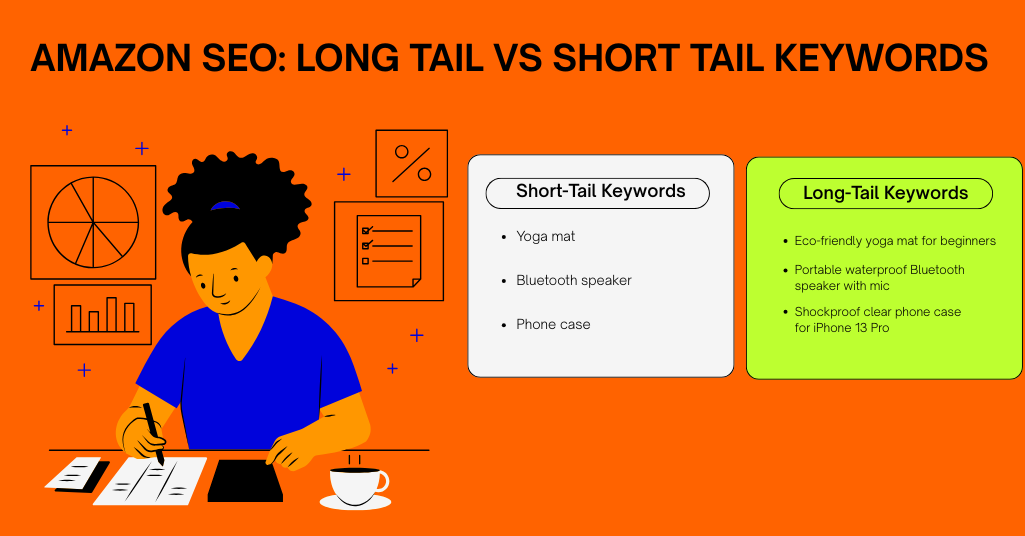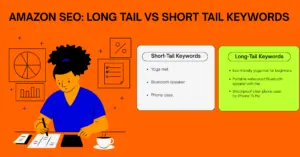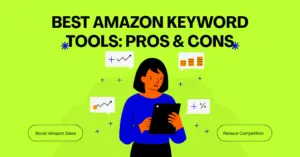Long Tail vs Short Tail Keywords for Amazon SEO & Ranking
Home »
Blog » Long Tail vs Short Tail Keywords for Amazon SEO & Ranking
How Long Tail and Short Tail Keywords Impact Amazon Sales

Every product on Amazon starts with a search. What buyers type in that little search bar decides which listings show up, which ones get clicked, and eventually, which products get sold. That is why keywords matter so much. They connect the customer’s needs with your product.
But not all keywords work the same way. Some are broad and short. Others are longer, more specific, and often more targeted. In simple terms, these are short-tail and long-tail keywords.
In the early days of selling on Amazon, sellers mostly focused on short-tail keywords. They looked for high-volume search terms, thinking that more traffic meant more sales. But over the years, the Amazon marketplace has become more competitive. Search behavior also changed. Buyers now use more detailed and specific phrases when they search, especially when they know exactly what they want. That is where long-tail keywords started to gain real value.
Sometimes keyword performance works as expected, and other times the results are surprising. I have worked with brands that launched products using short-tail terms and struggled with high ad costs. I have also seen small sellers use well-researched long-tail keywords to rank faster and convert better without burning through their ad budget.
In this blog, I will break down what short-tail and long-tail keywords really are, how they work on Amazon, and when to use each one. Whether you are launching a new product or improving an existing one, understanding how these keywords behave in the Amazon ecosystem can change your entire strategy and your results.
How To Rank for Keywords on Amazon for Better SEO & Rankings
How Amazon search engine uses keywords
Amazon’s A9 search engine picks up keywords from different parts of your listing like the title, bullet points, and backend fields. It looks for exact matches first. Then it checks relevance and performance history to decide if your product deserves a higher spot in the search results.
Amazon SEO vs Google SEO
Amazon SEO focuses fully on buying intent. If a keyword does not help convert into a sale, Amazon will not rank that listing for long. Google SEO works more around clicks and traffic. On Amazon, every keyword must lead to sales to stay effective.
Role in organic ranking, PPC, and backend search
Good keyword use drives both organic and paid ranking. Organic rankings depend on how your keywords perform over time. For ads, keywords impact visibility and cost per click. Backend keywords help improve discoverability without crowding the visible parts of your listing.
Short Tail Keywords Definition & Examples for Successful SEO
- Definition with examples: Short-tail keywords are one- or two-word terms that cover broad topics. For example, yoga mat or wireless headphones. They bring in large search volumes but are not always specific about what the buyer wants.
- High search volume and high competition: These keywords have high traffic, but many sellers use them. That leads to tough competition. It can be hard for new products to rank here without a strong sales record or high ad budget.
- When sellers use short-tail keywords: Sellers use them to reach wider audiences or when they already rank high. Established sellers with reviews often rely on these to defend their positions.
- Pros and cons: Short-tail keywords drive volume, but not all clicks convert. They may burn your ad budget quickly. Products with no reviews may struggle in these spaces.
Understanding Long Tail Keywords for Better Amazon Ranking
- Definition with examples: Long-tail keywords are specific phrases with three or more words. For example, eco-friendly yoga mat for beginners. These attract buyers who know what they want and are ready to buy.
- Lower volume, higher intent, lower competition: While search volume is low, conversion is high. These are easier to rank for and ideal for limited-budget sellers.
- Pros and cons: Long-tail terms bring better conversions, but slower traffic. They’re ideal for building steady sales momentum.
Short Tail vs Long Tail Keywords for Successful Amazon SEO
- Search Volume: Short-tail = more searches, less focus. Long-tail = fewer searches, better targeting.
- Conversion Rate: Long-tail converts better due to precise intent.
- Cost per Click: Long-tail terms usually cost less in PPC campaigns.
- Competition: Short-tail is crowded; long-tail offers entry points for new sellers.
- Buyer Intent: Short-tail = browsing; Long-tail = ready to buy.
What Works Best on Amazon & How It Boosts Rankings
- Product Launches: Long-tail keywords help new listings gain traction faster.
- Seasonal Trends: Combine short-tail with seasonal long-tail phrases for stronger seasonal impact.
- Niche Products: Long-tail keywords are ideal for niche targeting.
- New vs Established Sellers: New sellers should begin with long-tail terms. Established sellers can compete for broader terms.
- Organic & PPC Strategy: Use long-tail for listings; mix both in PPC and test performance.
- Buyer Journey: Appear at all buying stages with a mix of both keyword types.
Effective Keyword Optimization Tips for All Amazon Sellers
- Avoid keyword stuffing: Listings filled with unnatural keywords will reduce trust and conversions.
- Use keyword phrases naturally: Ensure your keywords sound organic and human to encourage clicks and purchases.
- Refresh for seasons: Adjust keywords as trends shift across months.
- Track and refine: Monitor performance and replace underperforming terms regularly.
Expert-Guided Amazon Keyword Strategy for Smarter Selling
Choosing the right keywords on Amazon goes beyond just picking what sounds good. It requires a deep understanding of buyer intent, product lifecycle stages, and ranking behavior. Both long-tail and short-tail keywords have their roles in a successful strategy.
To make informed, data-driven decisions, Squatio offers powerful tools and expert guidance. With Squatio, you can confidently plan, analyze, and optimize your keyword strategy—giving you a strong competitive edge in the Amazon marketplace.
 Every product on Amazon starts with a search. What buyers type in that little search bar decides which listings show up, which ones get clicked, and eventually, which products get sold. That is why keywords matter so much. They connect the customer’s needs with your product.
But not all keywords work the same way. Some are broad and short. Others are longer, more specific, and often more targeted. In simple terms, these are short-tail and long-tail keywords.
In the early days of selling on Amazon, sellers mostly focused on short-tail keywords. They looked for high-volume search terms, thinking that more traffic meant more sales. But over the years, the Amazon marketplace has become more competitive. Search behavior also changed. Buyers now use more detailed and specific phrases when they search, especially when they know exactly what they want. That is where long-tail keywords started to gain real value.
Sometimes keyword performance works as expected, and other times the results are surprising. I have worked with brands that launched products using short-tail terms and struggled with high ad costs. I have also seen small sellers use well-researched long-tail keywords to rank faster and convert better without burning through their ad budget.
In this blog, I will break down what short-tail and long-tail keywords really are, how they work on Amazon, and when to use each one. Whether you are launching a new product or improving an existing one, understanding how these keywords behave in the Amazon ecosystem can change your entire strategy and your results.
Every product on Amazon starts with a search. What buyers type in that little search bar decides which listings show up, which ones get clicked, and eventually, which products get sold. That is why keywords matter so much. They connect the customer’s needs with your product.
But not all keywords work the same way. Some are broad and short. Others are longer, more specific, and often more targeted. In simple terms, these are short-tail and long-tail keywords.
In the early days of selling on Amazon, sellers mostly focused on short-tail keywords. They looked for high-volume search terms, thinking that more traffic meant more sales. But over the years, the Amazon marketplace has become more competitive. Search behavior also changed. Buyers now use more detailed and specific phrases when they search, especially when they know exactly what they want. That is where long-tail keywords started to gain real value.
Sometimes keyword performance works as expected, and other times the results are surprising. I have worked with brands that launched products using short-tail terms and struggled with high ad costs. I have also seen small sellers use well-researched long-tail keywords to rank faster and convert better without burning through their ad budget.
In this blog, I will break down what short-tail and long-tail keywords really are, how they work on Amazon, and when to use each one. Whether you are launching a new product or improving an existing one, understanding how these keywords behave in the Amazon ecosystem can change your entire strategy and your results.




Long Tail vs Short Tail Keywords for Amazon SEO & Ranking
How Long Tail and Short Tail Keywords Impact Amazon Sales Every product on Amazon starts...
Share this link via
Or copy link